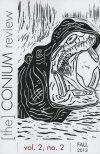The Conium Review – Fall 2013
The writers in this issue of The Conium Review have a talent for keeping things moving: tension, mystery, good old-fashioned action pulled off with clarity and skill, and the occasional bombshell of a metaphor. I found myself constantly itching to find out what was going to happen next, which is a feeling that literary magazines should induce more often in their readers.
The writers in this issue of The Conium Review have a talent for keeping things moving: tension, mystery, good old-fashioned action pulled off with clarity and skill, and the occasional bombshell of a metaphor. I found myself constantly itching to find out what was going to happen next, which is a feeling that literary magazines should induce more often in their readers.
The star of the issue is, without doubt, “Garbage Cannes.” In Claude Clayton Smith’s novella, an unnamed Yale graduate and sometime-student at the Iowa Writers’ Workshop tries to make a movie “about his boyhood.” With a somewhat deranged old friend, Iron Mike, as his sidekick, the aspiring filmmaker manages to score seed money from the “C. R. A. P.” fund, talk a German pilot-turned-Connecticut-farmer into flying a plane for the opening aerial shot, and get himself and Iron Mike dishonorably discharged from the volunteer fire department at his small hometown. The whole thing is ridiculous down to the details, but it’s great fun. It also satirizes sentimentality and prettiness through its narrator: Iron Mike’s eyes were “as innocent as the pure blue cloudless sky of my boyhood,” the antique car he rented for the film “looked just like the Little Black Stinker of my boyhood.” You hear “my boyhood” enough times, and you chuckle where you’re supposed to tear up with nostalgia. The narrator knows he’s absurd, and he embraces it. And so, like the loyal Iron Mike, the reader willingly goes along for the ride.
But you might be hard-pressed to extract any sort of deep feeling, or even closure, after you close the book on “Garbage Cannes.” Nothing seems to have changed for the characters after the adventure: the narrator invites Iron Mike to continue making the film, and Iron Mike says, as he has throughout the novella, “Sure.” This lack of transformation, of a sense that something has changed, seems to be a pattern in the stories in the issue, but there’s nothing wrong with simply showing the reader a good time.
Listen to the language here in Robert McGuill’s “Territorial Imperatives,” describing a guy warming up before a bar fight:
Verkauteran turns and throws a few lazy warm up punches to get the old adrenaline pumping. He dances around, doing a respectable-looking shuffle in the gravel, then looks up at the cluster of bystanders near the building and gives them a confident wink. He’s feeling good. Iron-balled.
The rhythm of the sentences starts with a roll, then gets clippy when it should. The story, told from the separate perspectives of a couple who have just had a fight, is efficient: there’s only as much standing around and thinking out loud as necessary, and what rumination there is is woven into the action so seamlessly that you hardly notice it at all. At the end, though, it’s hard to say that I’ve gained much insight into the characters, or even a sense of how their lives would go forward.
The poems are a mix of the bizarre and the lyrical, as well as sometimes breathtaking moments such as Richard King Perkins II’s “Gaze”:
we rhyme perfectly
and it’s heaven looking
with her pearl eyes
out at us
pleased.
It might be a love poem, or a description of a moment of communion or synergy. Whatever it is, it treads the line between cliché and over-the-topness very, very closely: “rhyme” is the understated but central activity, and “pleased” is likewise a simple surprise.
Natalie Peeterse, too, cuts to the core of experience: “The terror of this weather, I let out, / when what I want to say is I’m terrified of the day // going on much longer. . . .” More than the “eleven blue crosses” in the distance or “the hammer of the sky,” the speaker’s terror paints a visceral picture of the bleak landscape. And then this to end: “. . . Someone has lain down / to rest here and was unable to rise.”
As entertained I am, the pieces seem to run out of steam after the first three-quarters. At the end I often wonder, “Why do I feel like I’ve been set up for more than this?” For example, Paola Capó-García’s “Growing” leads us through a body’s metamorphosis and then drops the end with “These / metaphors don’t work.” I have to decide whether the ending is a deliberate anti-poetic stroke, or the poem is simply giving up. Thomas Mundt’s “I Was Very Sick,” which spins a dreary hospital stay into an absorbing read, ends with this: “That was against the doctor’s orders. He didn’t have my home phone, though. There was no way he could catch me. I wouldn’t let him.” But that idea doesn’t seem to have anything to do with anything earlier.
This issue of The Conium Review is packed with work from skillful writers. You’re never at a loss for action, or flipping to the end and wondering how long this angst-filled internal monologue is going to last. The rewards of reading, though, tend to come during the process rather than in a satisfying end.
[www.coniumreview.com]





